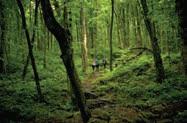The Wolf that Never Sleeps
The adventurous life of Robert
Baden-Powell,Founder of the Scout Movement
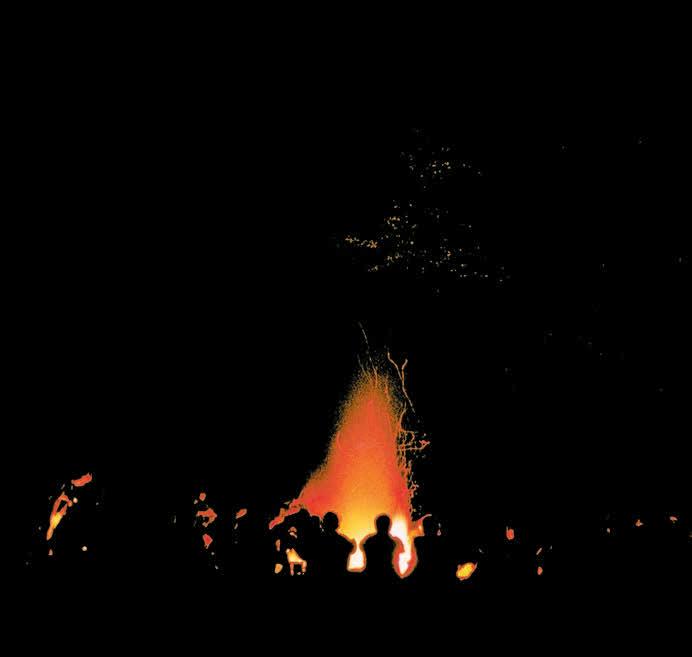


The Deutsche Nationalbibliothek lists this publication in the Deutsche Nationalbibliografie; detailed bibliographic information is available on the internet at http://dnb.d-nb.de
The Wolf that never sleeps - the adventurous life of Robert Baden-Powell
The founder of the Scout Movement
Walter Hansen
© Copyright 2017 by scoutingpress.com
Publication © by scoutingpress.com
Na Vyhlídce 844/5 - 19000 Praha 9
scoutingpress.com
ISBN 9783-887-785-246
All rights reserved. © Copyright 2017 by scoutingpress.com
No part of the work must in any mode (print, photocopy, microfilm, CD or any other process) be reproduced nor – by application of electronic systems – processed, manifolded nor broadcast without approval of the copyright holder.
I certainly do not doubt that Robert Baden Powell, with the founding of the world’s largest youth organization, is one of the outstanding personalities of the twentieth century because he envisaged an educational goal that was closely related to his personal life experiences, because he found a method to achieve this goal and because he was able to successfully apply this method during his lifetime.
One tried to approach his adventurous life story. His invention of the scout movement was regarded as an ingenious breakthrough. Anecdotes have been circulated, reported, interpreted, poeticized and heroized, even fabulated – depending on desire, inclination or alleged need.
My friend Walter Hansen, an old scout, renowned writer, youth book award-winner and committed investigator, recognized the connections between the life and work of Baden-Powell.
We studied sources for hours and tried to separate essential details from marginal ones - it was an interesting and exciting collaboration.
Above all, Walter Hansen has achieved something few authors had achieved before: he penetrated and worked through the history of Baden-Powell’s life and work in every chapter.
His style of writing appeals to young people in particular. I wish that many of them would read this book and be fascinated by the story of a personality that has presented millions of boys and girls with perspectives for their own lives.
Munich, August 2017
Hartmut Keyler
Member of the European Scout Committee 1968 – 1972 and 1977 – 1980
Member of the World Scout Committee 1971 – 1975 and 1985 – 1993
“You’re a Scout”, the publisher said to me, “and you’re a journalist and an author”. You wrote the biography of Lord Baden-Powell. So why don’t you write about what the Scout Movement means to you, about the role it plays in your life?”
All right then:
It all started with me and my friends at the age of around eleven years old, sitting in a field in front of a man who introduced himself as a Scoutmaster. He was wearing a green and yellow shirt with a sewed-on fleurde-lis symbol, a neckerchief and an unusual, wide-rimmed hat – the traditional Scout hat I am sure you are familiar with. But none of us had ever seen a hat like this before. We though it was great. It conveyed a sense of adventure, trappers and red Indians – all at the same time The man with the hat told us about the Scouts, the biggest youth organisation in the world, which had been founded by the British general Baden-Powell, a war hero who turned into a freedom fighter. And who strongly believed that wars could only be avoided if young people were able to develop friendships across borders and if boys and girls were allowed to come into contact with each other as early as possible. And so he founded the international youth movement of Boy Scouts Girl Guides. Every Scout is the brother of all other Scouts!
A few weeks later I made the Scout promise in front of a huge campfire. The Scoutmaster said the following: „I hereby welcome you to the huge brotherhood of Scouts“. And today I still feel a connection to this big brotherhood. When I bump into a friend from back then and we greet each other from afar with the Scout whistle, I immediately relive the joy I experienced during my time as a Scout. There was so much to do and experience then!
We spent most of our time playing in fields, forests and in the mountains. We spent our holidays in tent camps. And in the process, we learned all about map reading, following tracks, making fire without matches, Morse code, meteorology, survival techniques, emergency signals, secret codes and more. We sang Scouting songs. We wrote short plays, put them on as theatre performances and acted in them ourselves. We met Scouts – boys and girls – from different countries
and learned about one of the key principles of Scouting education: that differences in terms of nationality, race, religion, traditions and ideology are not a problem.
Finally, there is one particular success story from this time that I would like to talk about. Our geography teacher was working on an unusual doctoral thesis – a geologically annotated map of a mountain massif. On occasion he used to take pupils with him to help with the survey work. And he was completely bemused when I showed him that geographic north could not only be found with a compass and a set of survey instruments, or with the aid of the sun or Ursa Major in the night sky, but also by looking at the growth of moss on trees, beetle colonies under tree bark and distortions in the growth rings that can be seen on the stumps of felled trees. Or from the wind erosion in the mountains we were climbing in.
After graduating from high school in Germany, I studied at the Ludwig Maximilian University of Munich. I became a journalist, editor and very soon head of department at big daily newspapers. Occasionally I went on reporting trips across countries like Turkey, Syria and Iraq. And Scouting came into play again here! In those days, anyone who travelled like me as a journalist to the Middle East was immediately introduced to the local „high society“. In particular, nearly all of the local politicians and industrialists were Scouts, as were the British and US diplomats. Whenever it somehow came out that I was a member of the Scouts, the warm hand of friendship was immediately extended to me – as if was „among brothers“ – and a special trust was offered that provided unique advantages for a journalist far away from home.
One day, I found out by chance that there was no Scout Book in Germany. So I set out to write one. I remembered back to my Scouting days, visited young Scouts in tent camps along with adults who had made the Scout promise and now worked either professionally or on a voluntary basis within the individual Scouting organisations. Straight away we used the informal German „du“ when addressing each other, extended our left hands for the Scout handshake, and all of them offered tips to help me with my book. I felt it clearly that there was a willingness to help, itself one of the most important virtues of a Scout. After spending a year researching the world of Scouting, it was a great pleasure to write „Das große Pfadfinderbuch“ (The Big Scout Book) based on my own experiences and up-to-date information. It became a standard reference work and sold upwards of half a million copies.
My scouting skills, in particular my skills at map reading, proved invaluable to me when I toured the active volcanic regions of Iceland over the
course of several summers armed with just a tent and a sleeping bag. One of Europe‘s last wilderness reserves, this is a wondrous world of volcanoes, solidified lava flows, sand deserts, glaciers and rivers that demanded a smart approach in order to navigate them in off-road vehicles. In these volcanic zones I searched for the sources of the Edda legends, following the paths of the writers who had recorded the tales of Northern mythology while wandering through this isolation and solitude many centuries ago. I then wrote my book „Asgard“ and a 16-page report for GEO magazine.
Since then, the books I have written have all covered a wide range of different and unconnected topics: Medieval knights for example, and Eugène François Vidocq, the inventor of criminology; the Minnesingers (who formed a tradition of lyric and song writing in Germany in the 12th–14th centuries) and Daniel Boone, the most famous trapper in the Wild West; survival techniques and Richard Wagner, the world-famous composer and a dazzling figure in cultural history; or the Thirty Years‘ War – and Baden-Powell, the founder of the Scouting Movement.
When I researched Lord Baden-Powell and started writing about his utterly incredible adventures on three continents, about his philosophies and about his theory of education, I was particularly moved as a Scout. I learned at first hand how Baden-Powell had arrived at the understanding that more trust than is generally assumed should be placed in young people. How he evolved from a war hero to a friend and spokesperson for peace. And how his Scouting Movement conquered the whole world. There is nothing more to say about my book. You are already holding a copy of it in your hands – I hope you enjoy reading it!
From Childhood Days
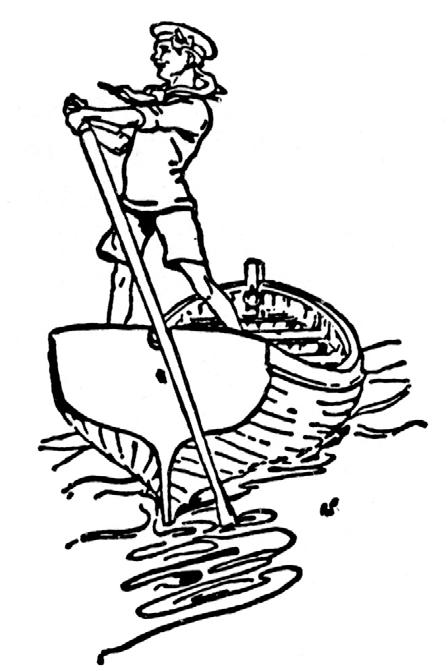
up to them against the wind direction, because the animals would otherwise flee from him, getting a whiff and thus being warned of the human smell. He also found out that he could secretly observe them from the trees, for the animals did not suspect an attacker from above, and the wind, no matter what direction it came from, blew the human scent over the heads of the game. For hours, Ste watched as deer and hares were on their guard against the fox, as their instincts protected them, as they almost always managed to escape when the robber made a mistake. But he also saw how the fox, with cunning and malice, creeping against the wind, kept chasing his prey again and again.
The old priest Allfrey and the relatives were often worried, if Ste happened to remain longer in the forests. They were afraid that the boy would get lost in the dark and couldn’t come back. Ste returned home, however, with a compass and self-drawn maps.
He went on to write down his scouting experiences. His commander, Colonel Baker Creed Russel, sent the completed manuscript to the General Staff, who had it printed and distributed to all the garrisons. Title of the book: “Reconnaissance and Scouting”.
Meanwhile, B.P. enjoyed much success in pigsticking. About 300 kilometers from Muttra, a competition of the best pigsticking hunters from all over India took place every year in the jungle of Kadir near the garrison town of Meerut. In 1882, B.P. reached fifth place. In 1883, he was the winner of the coveted Kadir Trophy: the highest trophy of this unusual and unusually popular sport.
His successes as an athlete and scout made him well known and eventually earned him an honourable task that he would have preferred to avoid: the Duke of Connaugh, Inspector General of British troops in India, called for B. P. to assume the role of a personal staff officer: a pencil pusher as B. P. described this job. From one day to
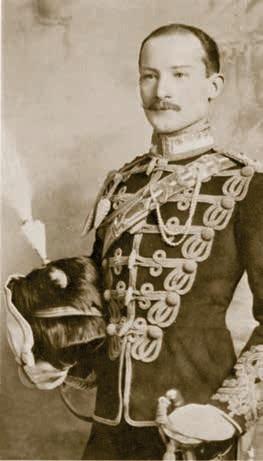
your turn comes to die, you can die happy in feeling that at any rate you have not wasted your time but have done your best “Be prepared” in this way, to live happy and to die happy-stick to your Scout Promise always-even after you have ceased to be a boy-and God help you to do it!
Your friend, Baden-Powell
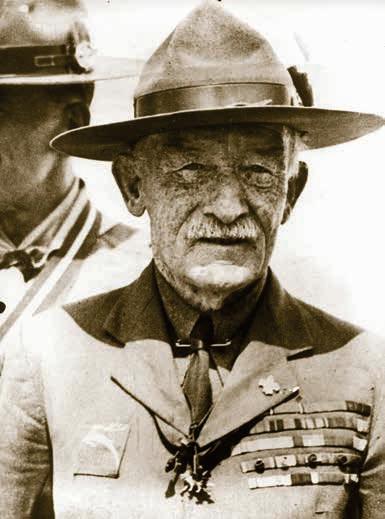 of Gilwell
of Gilwell
This was one of the respectful nicknames of an extraordinary man whose ideas became the cornerstone for a worldwide movement.
A love of peace, a willingness to lend a hand, a sense of duty and a bond with nature are the mainstays of the Scout Movement, “whose remarkable growth has surprised its promoters as much as its outside sympathisers,” said its founder, Lord Baden-Powell.
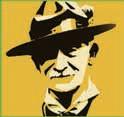

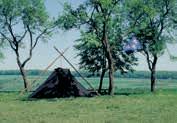
This modern biography tells the impressive story of the adventurous life of this astonishing man.
